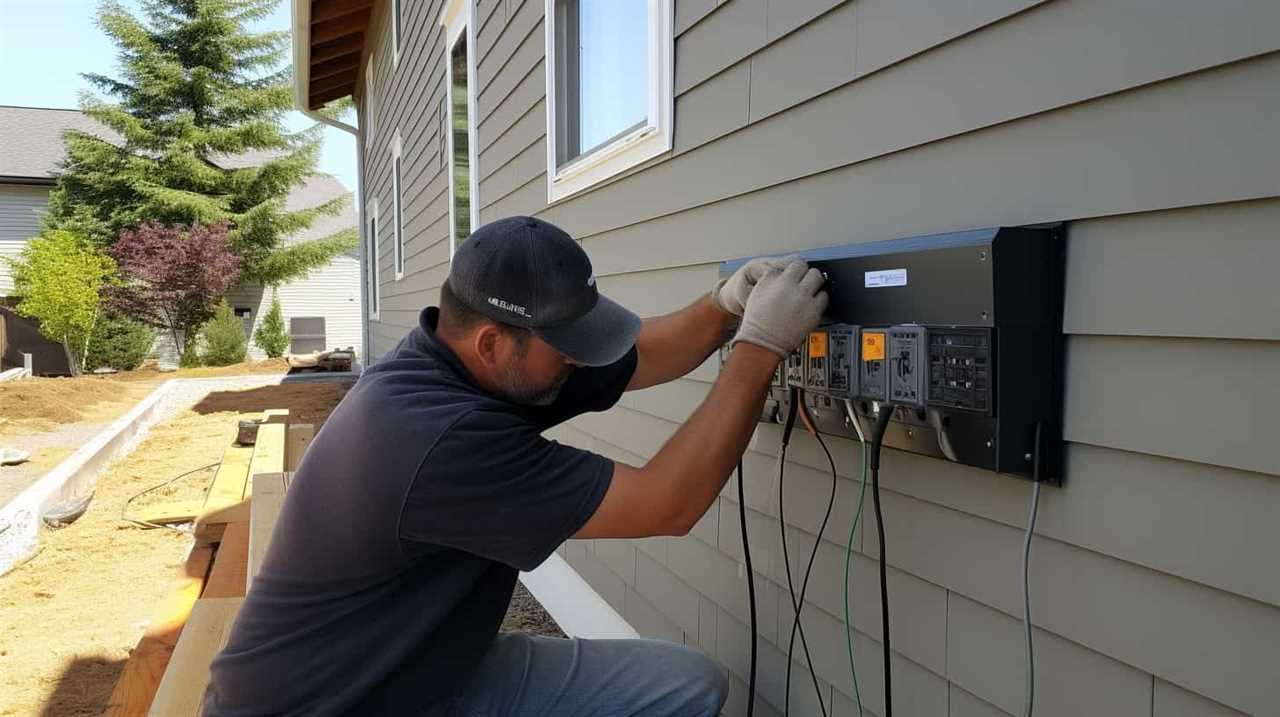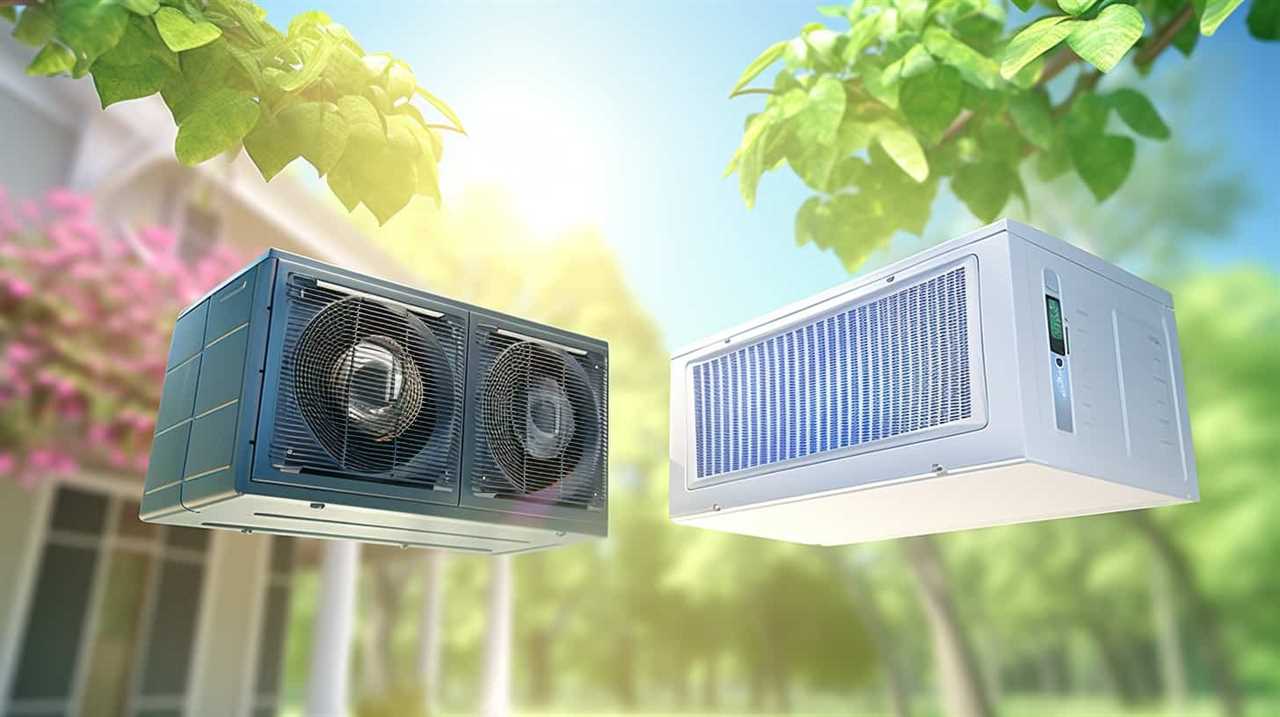Did you know that heating and cooling represent roughly 48% of the energy consumption in an average household?
But here’s the good news: by switching to efficient heat pumps, we can dramatically slash our carbon footprint.
Heat pumps not only reduce our reliance on fossil fuels but also lower our energy bills.
In this article, we’ll explore the environmental impact of traditional heating systems, understand heat pump energy efficiency ratings, and discover how heat pumps can help us build a more sustainable future.

Key Takeaways
- Heat pumps can significantly reduce greenhouse gas emissions and dependence on fossil fuels.
- Regular maintenance and energy-saving techniques can maximize energy savings and minimize carbon footprint.
- Government incentives, such as tax credits and grants, make heat pumps more affordable and promote their adoption.
- Heat pumps offer long-term cost savings, lower maintenance costs, and versatility in providing both heating and cooling functions.
The Environmental Impact of Traditional Heating Systems
We can’t ignore the environmental impact of traditional heating systems on our carbon footprint. These systems rely heavily on fossil fuels, contributing to greenhouse gas emissions and climate change. According to the United States Environmental Protection Agency (EPA), residential heating accounts for 11% of total greenhouse gas emissions.
This alarming statistic highlights the urgent need for more sustainable alternatives. Enter renewable energy sources and green building initiatives. By transitioning to heat pumps, which draw heat from the air or ground, we can significantly reduce our reliance on fossil fuels.
Heat pumps are highly efficient, using minimal energy to generate heat. This not only reduces our carbon footprint but also lowers energy costs. Understanding heat pump energy efficiency ratings is vital in making informed decisions about system selection, installation, and usage.
Understanding Heat Pump Energy Efficiency Ratings
To make informed decisions about heat pump selection, installation, and usage, it’s important for us to understand heat pump energy efficiency ratings. Heat pump technology advancements have led to significant improvements in energy efficiency, making them a more sustainable and environmentally friendly choice for heating and cooling.

Heat pump efficiency is measured by the Coefficient of Performance (COP), which indicates the ratio of heat output to the amount of electricity consumed. Factors affecting heat pump efficiency include outside temperature, system sizing, insulation, and maintenance. Higher COP values indicate greater energy efficiency and lower operating costs.
By understanding these ratings, we can choose heat pumps with higher efficiency, reducing our energy consumption and carbon emissions.
Now, let’s explore how heat pumps reduce carbon emissions.
How Heat Pumps Reduce Carbon Emissions
Heat pumps significantly decrease carbon emissions by utilizing renewable energy sources and minimizing reliance on fossil fuels. Here are three reasons why heat pumps are effective in reducing carbon emissions:

-
Role of government: Governments play a crucial role in promoting heat pump adoption by offering incentives, subsidies, and tax credits. These initiatives encourage homeowners and businesses to switch to more sustainable heating systems, thereby reducing carbon emissions.
-
Cost effectiveness: Heat pumps aren’t only environmentally friendly but also cost-effective when compared to traditional heating systems. They can reduce energy bills by up to 50%, resulting in long-term financial savings for consumers.
-
Renewable energy utilization: Heat pumps extract heat from the ground, air, or water, which are renewable energy sources. By using these sources, heat pumps eliminate the need for burning fossil fuels, reducing carbon emissions and dependence on non-renewable resources.
By embracing heat pumps, individuals and businesses can make a positive impact on the environment while enjoying the benefits of energy efficiency and cost savings.

Transitioning to the next section, let’s explore tips for maximizing energy savings with heat pumps.
Tips for Maximizing Energy Savings With Heat Pumps
For optimal energy savings with heat pumps, it’s important to properly maintain and regularly service your system to ensure efficient operation. By following a few energy-saving techniques and implementing regular heat pump maintenance, you can maximize your energy savings and reduce your carbon footprint even further.
One important energy-saving technique is to regularly clean or replace the air filters in your heat pump. Dirty filters can restrict airflow, making your system work harder and use more energy. Additionally, keeping the outdoor unit clean and free from debris, such as leaves or grass, can improve the efficiency of your heat pump.
Another tip for maximizing energy savings is to program your thermostat correctly. Set it to a comfortable temperature when you’re at home and lower it when you’re away or sleeping. This can help reduce unnecessary energy consumption.

Finally, scheduling regular professional maintenance for your heat pump is crucial. A professional technician can inspect and clean the system, check for any issues, and ensure that it’s operating at its peak efficiency.
The Future of Home Heating: Heat Pumps and Sustainability
We believe that heat pumps are the key to a sustainable future for home heating. As we look ahead, it’s clear that heat pumps have the potential to revolutionize the way we heat our homes. Here are three reasons why heat pumps are the future of home heating:
-
Smart home integration: Heat pumps can be integrated into smart home systems, allowing homeowners to control and monitor their heating remotely. This not only increases convenience but also helps optimize energy usage.
-
Government incentives: Many governments are offering incentives to encourage the adoption of heat pumps. These incentives can include tax credits, grants, and rebates, making heat pumps a more affordable and attractive option for homeowners.

-
Environmental sustainability: Heat pumps are highly energy-efficient and produce fewer greenhouse gas emissions compared to traditional heating systems. By transitioning to heat pumps, homeowners can significantly reduce their carbon footprint and contribute to a cleaner and greener future.
Frequently Asked Questions
Are Heat Pumps Suitable for All Types of Homes?
Heat pumps are suitable for all types of homes due to their versatility and efficiency. When considering heat pump installation, it’s important to take into account the specific needs of older homes. The benefits of heat pumps for older homes include improved energy efficiency and reduced carbon emissions.
How Do Heat Pumps Compare in Terms of Cost to Traditional Heating Systems?
When it comes to comparing costs, heat pumps offer both efficiency and long-term savings. They are a smart choice for reducing your carbon footprint and saving money on energy bills.
Can Heat Pumps Be Used for Both Heating and Cooling Purposes?
Heat pumps are a versatile solution for year-round comfort. They can be used for both heating and cooling purposes, maximizing energy efficiency and helping to slash our carbon footprint.

Are There Any Government Incentives or Tax Credits Available for Installing Heat Pumps?
Yes, there are government incentives and tax credits available for installing heat pumps. These incentives can help lower the cost of installation and encourage more people to switch to this energy-efficient solution.
What Are the Main Maintenance Requirements for Heat Pumps and How Often Should They Be Serviced?
Heat pump maintenance requirements include regular cleaning of filters, checking the refrigerant levels, and inspecting the outdoor unit. It is recommended to service your heat pump annually to ensure optimal performance and efficiency.
Conclusion
In conclusion, heat pumps offer a game-changing solution for reducing our carbon footprint and achieving a more sustainable future.
By efficiently converting renewable energy sources into heat, these innovative systems drastically cut down on carbon emissions.

With their energy-saving capabilities and long-term cost benefits, heat pumps are a smart choice for environmentally conscious homeowners.
Let’s embrace this technology and make a positive impact on our planet’s health.









